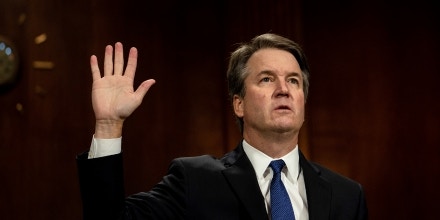ACTIVISTS, LED BY Ady Barkan, have now raised over $1.9 million in pledges for a future Democratic opponent of Sen. Susan Collins, R-Maine, promising to only make good on the pledges if the senator votes in favor of Judge Brett Kavanaugh’s nomination to the U.S. Supreme Court. Collins is expected to announce her decision on whether to back Kavanaugh’s confirmation at 3 p.m. EDT.
In stark contrast to the typical corporate campaign finance model, the activists’ innovative effort aims to send a message to the senator via a large number of small contributions. A source close to the campaign recently told The Intercept that the average donation is $28.40.
Collins is not responding well to the campaign. She went to the conservative website Newsmax to call the effort a “bribe.”
 Read Our Complete CoverageSupreme Privilege
Read Our Complete CoverageSupreme Privilege
“I consider this quid pro quo fundraising to be the equivalent of an attempt to bribe me to vote against Judge Kavanaugh,” she said. “I think it demonstrates the new lows to which the judge’s opponents have stooped.”
In this claim, Collins has been joined by others on the right who have similarly condemned the effort and called it “bribery.” Sens. Ted Cruz, R-Texas, and Orrin Hatch, R-Utah, both went on the attack.
The irony is that all of those who are now complaining about the small-donor organizing effort by Barkan have spent their careers defending the right of large-money donors to influence politics.
Collins, for instance, worked with her Senate Republican colleagues in 2014 to vote down a Democratic amendment to overturn the Supreme Court’s decision in Citizens United v. Federal Election Commission, which further opened the floodgates for corporations to spend money in politics. Two years earlier, she voted against the DISCLOSE Act, which would have required outside special interest groups to disclose their donors.
She is a prolific fundraiser, having raised millions of dollars from corporate interest groups despite the fact that she holds a very safe seat (she won re-election in 2014 with 68.5 percent of the vote). According to OpenSecrets, Washington, D.C.-based sources, largely lobbyists and contractors, have given her $1,517,130 — just short of the $1,521,190 she has raised from Portland, Maine.
Her top contributors are employees from the defense contractor General Dynamics and related political action committees. In a letter to constituents explaining her vote for the GOP-written tax reform bill, which dramatically slashed the U.S. corporate tax rate, she boasted of talking with General Dynamics about the law. Collins is also a frequent guest or host of private fundraisers where attendees pony up thousands of dollars to rub shoulders with corporations like Marriott International, Microsoft, Raytheon, and Boeing.
If Cruz is opposed to political bribery, it must be due to a recent change of heart. During a 2014 hearing on an amendment to reverse the Citizens United decision, Cruz defended the unlimited right to spend on elections as a constitutional guarantee. “This amendment, here today, would repeal the free speech protections of the First Amendment,” Cruz said. “As immune as we are to abuse of power from government, citizens are still astonished that members of Congress would dare support repealing the First Amendment.”
In 2015, when Cruz ran for president, fracking billionaire brothers Farris and Dan Wilks gave $15 million to Super PACs supporting his bid. Their motives for backing him aren’t particularly opaque: Cruz has called fracking a “providential blessing.”
Hatch has been similarly welcoming of big money donors, and is known as one of the top allies of the pharmaceutical industry on Capitol Hill. It is possible that he sees a moral imperative in preventing Colombia from producing cheaper cancer drugs. But a more likely motive is that both his campaigns for office and his foundation are financed by the drug industry.
Unlike the closed-door fundraising with millionaires, billionaires, and corporations favored by Collins, Cruz, and Hatch, Barkan’s effort is transparent and clear about its goal. It is unlikely that those who have argued that the superrich should have the unlimited right to spend in American elections are suddenly concerned about the influence money can have on politics. They just don’t like it when small donors play the same game.
Top photo: Sen. Susan Collins, R-Maine, is surrounded by reporters following a closed-door meeting of Senate Republicans on Capitol Hill, Sept. 26, 2018, in Washington, D.C.
We depend on the support of readers like you to help keep our nonprofit newsroom strong and independent. Join Us
No comments:
Post a Comment